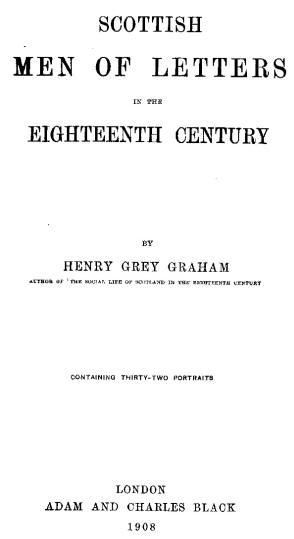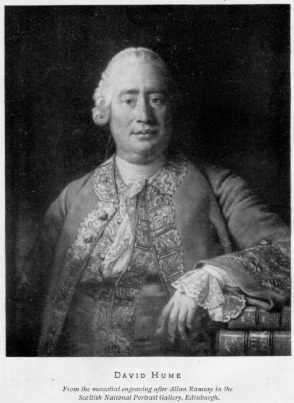

PREFACE
The
eighteenth century forms a very distinct period of Scottish literary
history, for of its men of note not one had begun to write when the century
began, and all of them, except Dugald Stewart, had ceased to write when it
ended. This volume, however, does not aim so much at giving a history of the
literature as at giving an account of the men who made it. Most of the Scots
writers had all the characteristics of their country in their speech, their
manners, and ways of living, and they preserved their individualities and
peculiarities unsuppressed by those social conventions and restraints of
fashion which in a later age moulded their countrymen to more ordinary
types. It is these personal characteristics, old-fashioned and pronounced,
which render them all the more interesting. We are helped very little to a
knowledge of them by biographies written by their friends, for these
consisted chiefly of brief, colourless memoirs prefixed to their works.
Neither can we gain a picture of their times by such diaries and voluminous
correspondence as abounded in England, from which we can reconstruct the
social life of the age. In Scotland no diaries were written, little
correspondence was preserved: the writers themselves did not keep copies for
publication, or their friends did not keep the originals for love. Probably
they wrote few letters: being of a frugal mind, they may have grudged the
postage. Even the biographies which were written by contemporaries of the
men of letters are disappointing. Dugald Stewart, in his Lives of Reid,
Robertson, and Adam Smith, would not spoil a fine period by introducing an
anecdote or a personal trait, which would have been of far more interest and
value than a hundred sonorous pages. That Adam Smith should have said in his
lectures on Rhetoric that he was glad to know that Milton wore latchets in
his shoes instead of buckles, to him must have seemed a lack of due sense of
literary dignity. In two important quartos Lord Woodhouselee gives a history
of Lord Kames, which lets us know as little of his Lordships real
characteristics when we close the last page as when we opened the first. It
is a curious fact that when in 1811 the relatives of Dr. Carlyle of Inveresk
thought of publishing his Autobiography, which is invaluable as a picture of
his times and his friends, they were discouraged by those they consulted -
Adam Ferguson among the number - on the ground that the incidents and
anecdotes were too unimportant to interest the public. Fortunately we learn
much about the men of letters who lived in Edinburgh from the traditions and
stories remaining in the recollection of those to whom their presence was
familiar, which in various ways have been handed down. An apology perhaps
should be made for entitling one Chapter Women of Letters, for strictly
speaking it describes women who were not literary persons, like their
learned sisters in England. Their whole output consisted of one or two
songs; yet these have survived the laborious contributions of women of
letters south of the Border. An apology is certainly due to the shades of
those high-born dames for bringing them into the company of men who wrote
for vulgar fame or money; seeing that their life-long anxiety was to conceal
from the public the fact that they had ever written a line or composed a
verse. Each of these ladies desired, as the erudite Miss Aikin said of
Joanna Baillie, to lie snug in the asylum of her taciturnity.
In
giving portraits of the men of letters, the effort has been made to take
them when possible from original paintings, and by preference from those
which have not before been copied. Thanks are due to General Carlyle Bell
for allowing the author the use of unpublished manuscripts of his relative,
Dr. Carlyle of Inveresk.
H. G. G.
CONTENTS
|

